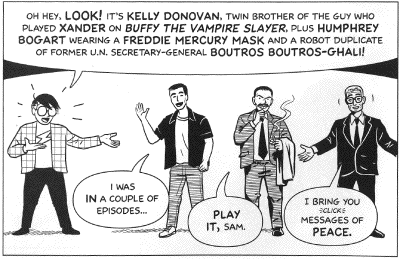Making Comics
One of the happy fringe benefits of my Wrens trip was shopping in the enormous Barnes & Noble at Newport on the Levee, where I picked up Scott McCloud's latest: Making Comics (2006). Like its predecessors, Understanding Comics (1993) and Reinventing Comics (2000), Making is a treatise on the art of comics in comics form. Taken together, these three books might well comprise the most significant effort at media criticism since McLuhan.
Mark Bernstein, whose talk at Hypertext '99 made me aware McCloud in the first place, calls this book a "gloss" on Understanding Comics, which strikes me as a bit trivializing, although I understand the point. Whereas Understanding provides the grand perspective of comics as an art form and Reinventing envisions possible futures for comics in a digital age, Making is more concerned with specific technical issues of comics craft. In some ways, the task it sets for itself is more challenging than the other books, for McCloud is trying to dissect the fundamental comics techniques without devolving into yet another how-to-draw-like-me book. The result is somewhat uneven. I agree with Mark that the section on facial expressions is "brilliant and... unmatched" (not that I'm well-read in that area). On the other hand, I share Mark's feeling that the storytelling part of comics could have been more detailed. However, I suspect some of my (and Mark's?) disappointment on that point stems from my literature background. Graphic artists probably think the discussion of perspective is skimpy, etc. Like Mark, I'd like to see much more, but I've felt that way at the end of each of McCloud's books. That may just be a testament to his uncanny ability to make even an aesthetic treatise engaging and entertaining.
Two features of McCloud's work, though, are so remarkable that they trump any quibbles I might have with individual arguments or matters of emphasis. The first is is his ability to communicate the essence of what makes comics comics. He can, in the space of a single panel, illustrate a complex point with such startling clarity that it seems self-evident. For example, this panel (cited also by Mark) regarding the interplay of word and image in comics:
The second remarkable feature of McCloud's work is his generosity. Even while fighting against entrenched assumptions and prejudices about comics, his work is consistently open, inviting and non-censorious. He does not advocate comics by belittling other arts, nor does he use these books as a pulpit for advocating a a particular flavor of comics he prefers (except to say that the form needs to branch out beyond its traditional themes and target audiences). Far, far too much critical writing elevates its subject an the expense of others. Early hypertext criticism moaned about how limited and coercive print was. "New media" and game studies criticism frowns on mere hypertext as lacking interaction and agency. Literary critics complain that their favorite authors are neglected and try to get them into the canon by knocking someone else out. These critical maneuvers are tempting, especially when one sincerely believes in one's subject, but they are cheats. It is very much to McCloud's credit that he eschews such tactics.
To conclude then, Making Comics is not McCloud's most important book, but it continues the important and groundbreaking work that he began in Understanding Comics and Reinventing Comics. I'd recommend it to anyone with an interest in either comics craft or who enjoyed his previous books. For anyone who is interested in media theory, I'd suggest immediately buying all three and reading them back to back to back. Get to work.

